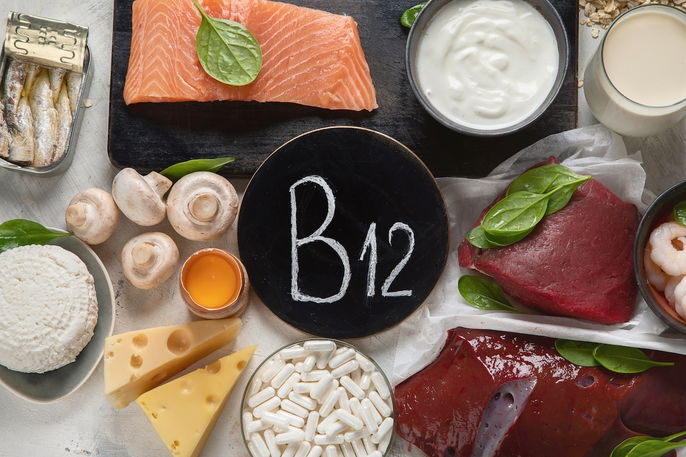Foods that are rich in vitamin B12 are typically found in animal-based sources, like fish, seafood, meat, eggs and dairy products.
Vitamin B12 is only found as an additive in plant-based food products. This means that the food manufacturer adds artificial vitamin B12 to the food, which occurs with soy milk, rice milk, and breakfast cereals, for example. People who adhere to a vegan diet can consume vitamin B12 through fortified food products or through supplementation.
Vitamin B12 is essential for many important bodily functions, like nervous system health, DNA formation and red blood cell production.

Food with vitamin B12
The following table shows the amount of vitamin B12 in 100 g of each food item:
Vitamin B12 is present in very low quantities in food, which is why it is measured in micrograms (which is 1000 times smaller than 1 mg).
Vitamin B12 is absorbed in the gut and mainly stored in the liver. Therefore, liver is considered to be one of the main food sources of vitamin B12.
Recommended daily B12 dose
The recommended daily dose of B12 depends on the patient’s age:
- 0 to 6 months: 0.4 mcg
- 6 to 12 months: 0.5 mcg
- 1 to 3 years: 0.9 mcg
- 4 to 8 years: 1.2 mcg
- 9 to 13 years: 1.8 mcg;
- 14 years to adulthood: 2.4 mcg
- Pregnant women: 2.6 mcg
- Breastfeeding women: 2.8 mcg
Vitamin B12 is essential for preventing anemia, along with other nutrients like iron and folic acid.
Forms of B12 and intestinal absorption
Vitamin B12 exists in various different forms, and is normally linked to cobalt. The combination of B12 with cobalt is also known as cobalamin. In the human body, vitamin B12 takes the form of methylcobalamin and 5-seoxyadenosylcobalamin to be used in metabolism.
To be absorbed in the gut, vitamin b12 is disconnected from protein through the action of stomach acid. After this process, it is absorbed in the final section of the small intestine along with instrinsic factor (which is a substance produced by the stomach).
Who is at risk for B12 deficiency?
Those who are at most risk of suffering from vitamin B12 deficiency are:
- Strict vegetarians and vegans, as they do not consume foods of animal origin
- Elderly people, due to the emergence of pernicious anemia, which reduces the production of intrinsic factor, a protein that is important for the absorption of vitamin B12
- People taking omeprazole and pantoprazole to reduce stomach acid
- People who have undergone bariatric surgery
- People with digestive diseases, such as Crohn's disease and celiac disease
In these cases, it is necessary to use supplements of this vitamin to prevent problems such as anemia and malfunction of the nervous system, causing symptoms such as numbness, tingling and burning in the feet, stiffness and generalized weakness in the legs, depression and poor thinking.
Also recommended: Vitamin B12 Deficiency: Symptoms, Causes & Treatment tuasaude.com/en/vitamin-b12-deficiencyVitamin B12 and vegetarianism
People who have adopted a vegetarian diet can maintain great levels of B12 in the body by consuming eggs and dairy products.
People who follow a strict vegetarian or vegan diet may encounter difficulties in consuming the recommended daily amount of B12. These patients are advised to consult a registered dietitian or doctor to determine whether their diet is adequate. A health care professional may recommend increased consumption of fortified plant-based milk, cereals or soy products. Supplementation for low levels of B12 may also be prescribed - read more about B12 injections and when they are recommended.






























